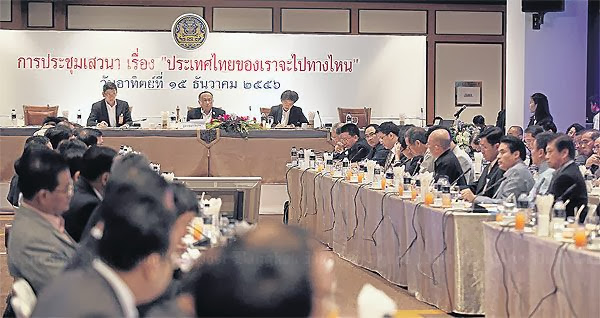 |
| Prominent union leaders join hands in unity during a gathering in Phnom Penh, Feb. 10, 2014. |
His administration has also drawn criticism over its heavy handed response to protests by Cambodia’s garment workers for wage increases, including a crackdown last month by security forces that left five people dead and resulted in nearly two dozen arrested.
Speaking at a graduation ceremony in the capital Phnom Penh, Hun Sen said that his government’s “fifth mandate was established by the [July 28] election” and that his administration was “carrying out work as usual” despite efforts by some groups—which he did not name—to hold the country “hostage.”
“We won’t allow anyone to take Cambodia as their hostage,” the head of the ruling Cambodian People’s Party (CPP) said.
“People can say whatever they want, but today I am handing out [graduation] certificates to students. This is a normal process of state institutions, the National Assembly [or parliament], senate and the government.”
Opposition Cambodia National Rescue Party (CNRP) deputy president Kem Sokha said Hun Sen, who has ruled Cambodia for nearly three decades, was “concerned about his illegitimate government.”
“The illegal government is being pressured by the international community on its killings [of protesters] and attacks on the freedom of assembly,” he told RFA’s Khmer Service.
The CNRP claims it was robbed of victory in last year’s elections which it said were marred by fraud and other irregularities. The government-appointed election body declared Hun Sen's CPP the victor and dismissed calls for an independent investigation by the CNRP which has boycotted parliament.
Authorities in Phnom Penh issued a ban on public gatherings following a Jan. 3 deadly crackdown by security forces during a strike by garment workers demanding higher minimum wages.
The ban also followed authorities’ violent dispersal of CNRP supporters at the capital's Freedom Park after they demanded that Hun Sen step down and hold fresh elections.
Call for release
Also on Monday, nongovernmental organizations and activists launched a campaign in front of Phnom Penh’s Royal Palace to demand the release of those still held by authorities in the aftermath of the January crackdown, as a prison official said several of the detainees had gone on a hunger strike.
Prison authorities released two of the detainees last week, but 21—including rights defenders Vorn Pao, Theng Soveoun, and Chan Putisak—remain in Kompong Cham’s remote Correctional Center 3 (CC3), which rights groups have labeled “among the harshest prisons in Cambodia.”
A court in the capital is scheduled on Feb. 11 to hear an appeal by the 21 against an earlier decision to deny them bail. They had been charged with causing violence and damage to property.
Rong Chhun, the President of the Cambodian Confederation of Unions, said at Monday’s gathering that if the Appeals Court refuses to release them, at least 10 of the country’s biggest unions would lead protests against the government, despite the ban on gatherings.
“We all have agreed that if the 21 people are not released and the workers’ salaries are not raised we will hold massive demonstrations across the country,” he said.
Nearly 60 NGOs released balloons across the country in solidarity to call for the release of the detainees.
Government forces in Phnom Penh did not interfere with the gathering at the Royal Palace.
Ouk Savuth, chief prosecutor at the Appeals Court, told RFA that he could not predict how the judges would rule on Tuesday.
“The judges will decide when they meet,” he said. “I can’t guess [the outcome] as I am not a judge.”
Several of the remaining detainees have also launched a hunger strike to demand their release, Agence France-Presse reported Monday, quoting CC3 director Kea Sovanna.
Sixteen of the 21 people had begun to fast on Sunday and “now nine detainees still continue their hunger strike,” he said, adding that officials were trying to encourage them to eat.
The Phnom Penh Post quoted Prak Sovannary, wife of Vorn Pov, as saying that the hunger strike would continue until the courts release the prisoners.
“When I visited [Pov] on Friday, he told me [the detainees] were not wrong,” Sovannary said. “[Pov said] they did not use violence against anyone and demand their release.”
Open letter
In an open letter to Hun Sen, a dozen international human rights groups and labor rights organizations on Monday called for the release of the 21 and for the government to lift its ban on public gatherings.
The organizations joined the global unions International Trade Union Confederation (ITUC), UNI Global Union and IndustriALL in urging the Cambodian government to end its “repression of the rights to freedom of peaceful assembly, expression, and association.”
The open letter urged that the authorities “immediately and unconditionally” drop all cases against those being investigated in connection with protests “solely on account of their exercise of basic human rights.”
“The Cambodian government’s detention of activists and ban on protests are generating intense public concern not just in Cambodia, but around the world,” said Phil Robertson, deputy Asia director at New York-based Human Rights Watch.
Robertson called on governments concerned about the rights of the Cambodian people to “make their voices heard.”
Reported by RFA’s Khmer Service. Translated by Samean Yun. Written in English by Joshua Lipes.









.jpg)







 2/22/2014 12:50:00 PM
2/22/2014 12:50:00 PM
 Unknown
Unknown








.jpg)
